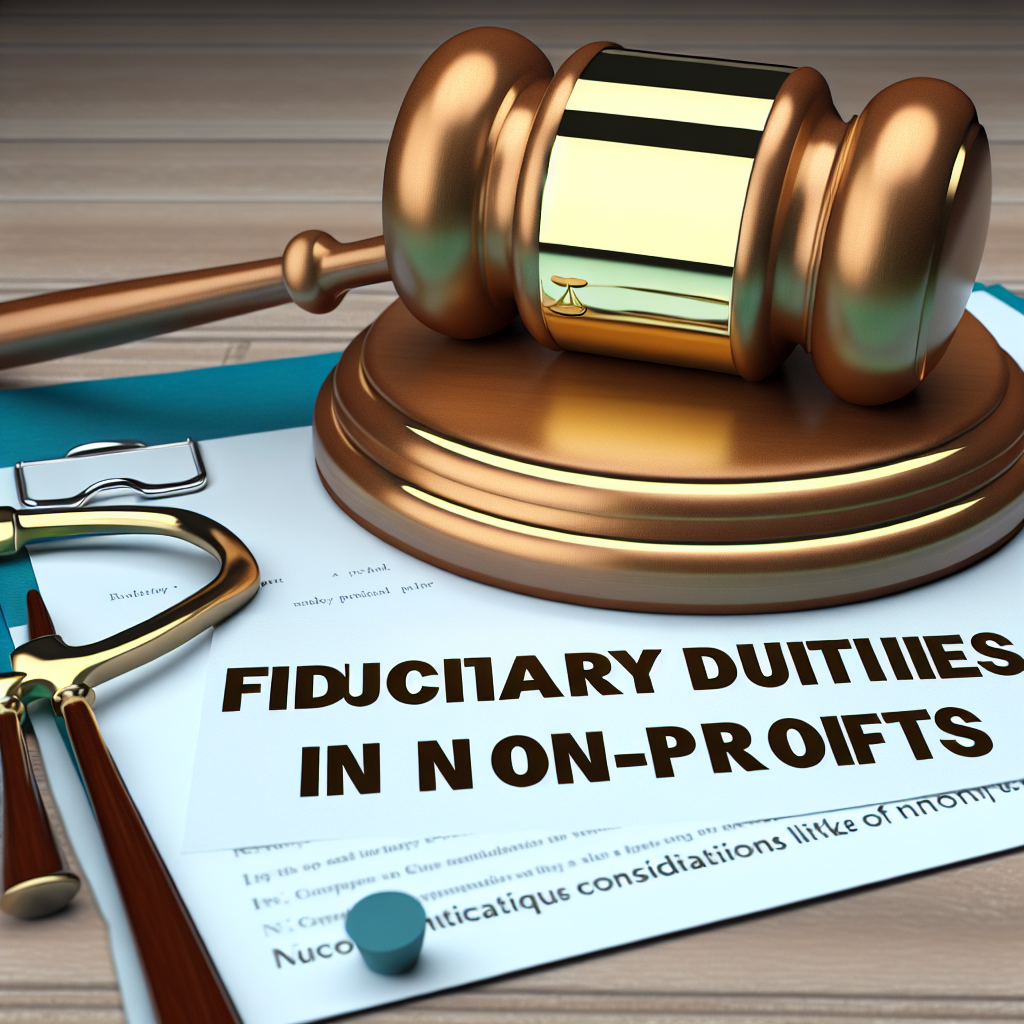
Fiduciary Duties in Non-Profits: Unique Considerations
Introduction to Fiduciary Duties in Non-Profits
In the realm of non-profit organizations, fiduciary duties play an integral role in ensuring ethical governance and compliance. These duties, rooted in legal and moral responsibilities, dictate how board members and executives must act in the best interests of the organization and its mission. At The Consultant Global, we understand the unique challenges faced by non-profits in navigating fiduciary duties and are dedicated to providing expert guidance tailored to your organization’s needs.
Understanding Fiduciary Duties
Fiduciary duties encompass two primary responsibilities: the duty of care and the duty of loyalty. These duties apply to all non-profit governance structures, ensuring that decisions are made with diligence and priority placed on the organization’s mission.
1. Duty of Care
The duty of care mandates that board members and executives act in a reasonably prudent manner when making decisions on behalf of the organization. This includes:
- Staying informed about the organization’s activities and financial status.
- Participating in board meetings and decision-making processes.
- Making decisions based on rational judgment rather than personal interests.
Non-profit leaders must actively engage in strategic planning, financial oversight, and policy development to fulfill their duty of care effectively.
2. Duty of Loyalty
The duty of loyalty requires board members and managers to prioritize the interests of the non-profit over personal interests or those of third parties. Key aspects include:
- Avoiding conflicts of interest.
- Disclosing any potential conflicts in a timely manner.
- Making decisions that benefit the non-profit’s mission.
Non-profits must implement conflict-of-interest policies to ensure transparency and accountability in all dealings.
Unique Considerations for Non-Profits
While fiduciary duties are fundamental across all sectors, non-profits present unique challenges and considerations:
1. Diverse Stakeholders
Non-profits often have multiple stakeholders, including donors, members, volunteers, and the communities they serve. Balancing these diverse interests while adhering to fiduciary duties can be complex. Governance structures must be designed to incorporate stakeholder input and maintain transparency.
2. Resource Constraints
Unlike for-profit organizations, non-profits frequently operate under budget constraints. Board members must make judicious decisions regarding resource allocation, ensuring that every dollar spent advances the organization’s mission. This heightened scrutiny necessitates robust financial oversight and strategic expenditure planning.
3. Regulatory Compliance
Non-profits are subject to a variety of regulations that differ by jurisdiction. This can include compliance with IRS requirements in the U.S., charity registration laws in the U.K., or relevant UAE regulations for non-profits. The evolving landscape of compliance necessitates ongoing education and proactive management strategies to adhere to legal obligations.
Best Practices for Upholding Fiduciary Duties
To navigate the intricacies of fiduciary duties effectively, non-profit organizations can adopt best practices that promote accountability and transparency:
1. Establish a Comprehensive Governance Framework
A well-defined governance framework includes clearly articulated roles and responsibilities, conflict-of-interest policies, and procedures for decision-making. This structure ensures that all board members understand their obligations and facilitates a more effective decision-making process.
2. Regular Training and Education
Investing in ongoing training for board members nurtures a culture of compliance and ethical governance. Education on fiduciary duties, regulatory changes, and best practices equips leaders to make informed decisions aligned with their responsibilities.
3. Foster Open Communication
Encouraging open dialogue among board members, staff, and stakeholders is vital. Regular meetings and updates facilitate transparency, ensuring all parties are informed of the organization’s activities and challenges.
The Role of The Consultant Global
At The Consultant Global, we offer a wealth of experience in guiding non-profit organizations through the complexities of fiduciary duties. Our team possesses unique expertise backed by extensive experience in various sectors, enabling us to evaluate client needs accurately and provide customized, actionable solutions.
Our understanding of cultural nuances within the GCC and UAE markets positions us as a trusted partner for non-profits seeking to excel in their governance practices. We are committed to becoming your advisors by leveraging our diverse language skills, including English, Turkish, Azerbaijani, Russian, and French, to engage effectively with your organization.
Conclusion
Fulfilling fiduciary duties in non-profit organizations is a critical aspect of governance that requires diligence, loyalty, and transparency. By embracing best practices and leveraging expert guidance from The Consultant Global, non-profits can navigate these responsibilities effectively and focus on their mission-driven objectives.
In conclusion, the unique considerations of fiduciary duties in non-profits highlight the need for proactive governance. The Consultant Global is dedicated to supporting your organization in achieving its full potential while maintaining compliance and ethical integrity. We are committed to getting things done!




Leave a Reply